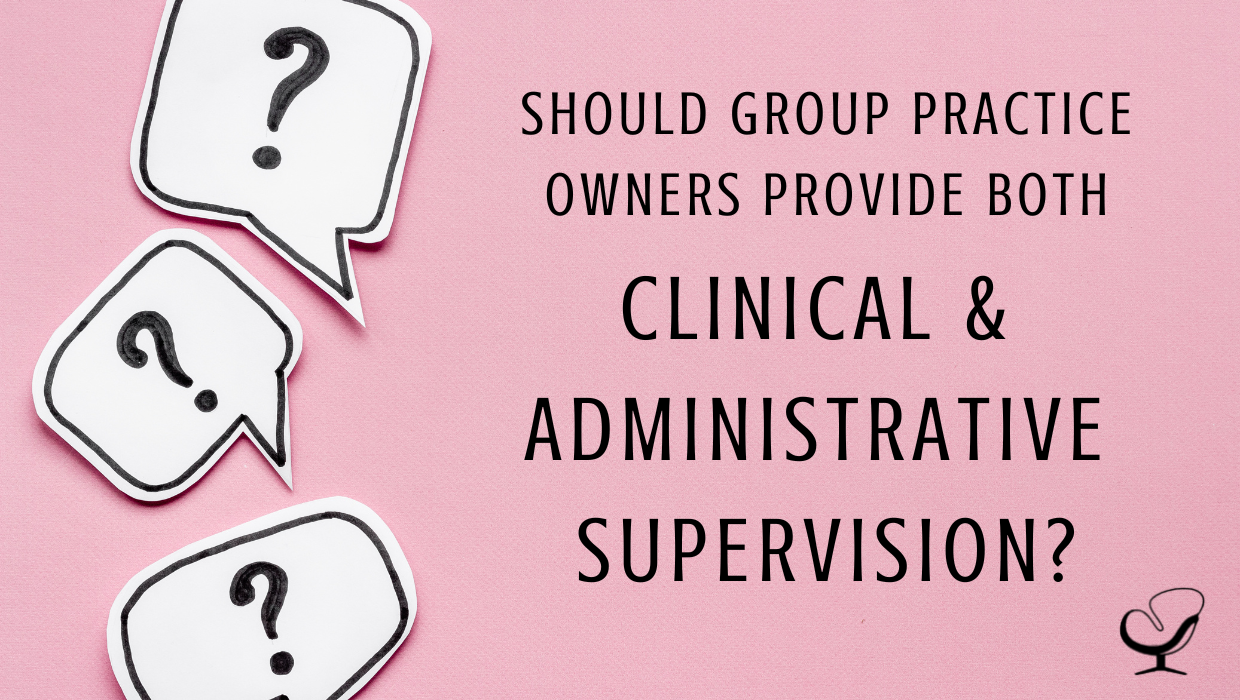One of the things that many group practice owners wrestle with is how to provide both clinical and administrative supervision to its therapists. If you’ve gotten to the point of being a group practice owner, you’ve likely had some experience providing clinical supervision at least. And almost all group practice owners provide administrative oversight for their therapists. But, what is the best way to provide both?
As a Group Practice Owner, Consider the Following
Perhaps you’re a group practice owner with a mix of provisionally-licensed and independently licensed therapists, which is often the case. Your therapists have varying levels of experience, supervision or consultation needs, and you probably have lots of demand on your time as the practice owner. You love providing clinical supervision and really believe in nurturing the newer therapists. And it’s “free” for the practice if you provide the clinical supervision to your therapists.
But what happens when the needs of the practice are different from the supervision needs of the therapist? And when you provide both the administrative/practice supervision and the clinical supervision? Your “supervision” gets pulled in two different directions, and usually, the therapist gets the short end of the stick.
Refreshers on Administrative and Clinical Supervision
Administrative Supervision
Administrative Supervision covers anything that is related to working at your group practice that is not actual clinical work. It could include onboarding, training, schedule management, assessing the fit of clients to therapist, special projects, leadership experiences, or anything else. There are plenty of opportunities for administrative supervision in group practices.
Clinical Supervision
Clinical supervision is anything related to the clients that the therapist is seeing. However, some topics can be either administrative or clinical, appropriate for either type of supervision. Client retention could be part of clinical supervision or administrative supervision. Clinically, is the client a good fit with the therapist, is a relationship developing, are goals being identified and worked towards. Administratively, is the therapist scheduling out the client 1-2 months ahead of time?
The Trouble with Combining Administrative and Clinical Supervision
Often, there is so much administrative oversight needing to be done that if it is combined with clinical supervision, the actual clinical supervision gets pushed to the side. Maybe there’s only 15 minutes left to discuss cases and the therapist has several tough cases to review. Or maybe the therapist doesn’t feel safe being open and vulnerable, which is necessary in clinical supervision, when getting admin oversight from the group practice owner.
Separate Administrative and Clinical Supervisors
It can become a conflict of interest for a group practice owner to provide both clinical and administrative supervision. Having received “clinical supervision” in the past, many times, that was actually only administrative supervision, I’d like to make a case for having the group practice owner provide the administrative supervision and another therapist provide the clinical supervision.
Having separate supervisors provide these separate functions is a nice delineation for the therapist or supervisee. The therapist knows they have their clinical supervision 100% by their side, and feels free to open up, share, and be vulnerable so true learning and professional development can occur. Perhaps another licensed therapist at your practice can provide the clinical supervision while you as the group practice owner provide the admin oversight. Or you or the therapist can contract out with an outside supervisor to provide these services.
Professional Development Implications for Separating Admin and Clinical Supervision
The more exposure a supervisee or therapist has to other clinical supervisors, experienced therapists or even others at their same level, the better therapist they will end up being. They will have more varied learning experiences, be exposed to more therapeutic modalities and styles, and will learn even more than they would learn just being a part of your group practice.
I know it’s hard, especially when you’re just starting your group practice, to want to do it all. But in this case, there are so many benefits for not doing it all and having someone else provide clinical supervision to your therapists, you might want to consider it. The long-term benefits will far outweigh the short-term costs.
Previous Articles By Shannon For Group Practice Owner
Take It From One Group Practice Owner: Things You Shouldn’t Do
Take It From One Group Practice Owner: Things You Should Do
How to Get Through the Holidays as a New Group Practice Owner
Setting Up Your Group Practice Website
How to Find Good Therapists to Hire for Your Group Practice
How to Hire Your First Therapist When You’ve Never Hired Before
Don’t Settle When Hiring Clinicians
Hiring Your First Clinician, Part 1
Hiring Your First Clinician Part 2
Hiring Your First Clinician Part 3
Shannon Heers
 Shannon Heers is a licensed professional counselor in Colorado. She owns the private-pay group practice Catalyss Counseling in the Denver metro area, focusing on helping adults manage their anxiety, grief, and trauma. Shannon is also an experienced clinical supervisor and manager who offers business consultation services to other therapists. She balances working with raising her two young children.
Shannon Heers is a licensed professional counselor in Colorado. She owns the private-pay group practice Catalyss Counseling in the Denver metro area, focusing on helping adults manage their anxiety, grief, and trauma. Shannon is also an experienced clinical supervisor and manager who offers business consultation services to other therapists. She balances working with raising her two young children.
Group practice ownership is daunting but can be done easily if you do your homework, prepare, and learn all you can about the process!

